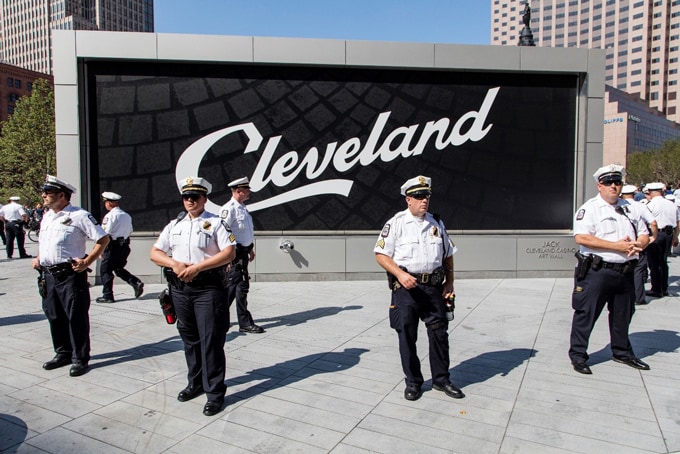Republican National Convention in Ohio
On July 18 -21, 2016, Cleveland, Ohio, hosted the Republican National Convention (RNC), seeing an influx of nearly 70,000 visitors to the area, including delegates from every state and territory. This event, like other large political gatherings, was considered a National Special Security Event, meaning that it was a potential target for terrorism or other criminal activity. Millions tuned in from around the world to watch these delegates choose Donald Trump and Mike Pence as the Republican Party’s nominees for President and Vice President of the United States. Federal partners, including CDC, met continuously and well in advance of the event, with local and state agency partners to ensure coordination and planning occurred among local, state and federal partners.
Based on the past experiences of other states that had hosted national conventions, the biggest priorities were to prepare for radiological attacks, riots, and a surge in the healthcare and emergency medical systems. For more than a year, CDC and health department staff worked with the U.S. Secret Service to plan for this event through numerous trainings and full-scale exercises. PHEP-funded staff provided infectious disease and epidemiology expertise and coordination support before and during the convention, including staffing the operations center at the state health department as well as the state Emergency Operations Center.
In addition to the convention-specific training, lessons learned from previous exercises and incidents contributed to ensuring that the RNC went smoothly. In 2014, a tristate Strategic National Stockpile exercise provided opportunities to test the data inventory system that are now used in Medical Countermeasure (MCM) response. With input from local health departments and other state partners, Ohio Department of Health (ODH) was able to adopt a new system that allowed for a more streamlined approach to inventory management. With input from internal staff and local health departments, ODH implemented a new system that helped to relieve those bottlenecks in MCM planning for the RNC.
The biggest difference in preparing for the RNC versus other public health incidents was a general idea of what to expect. Based on past conventions and input from the Secret Service, as well as the year of advance planning, ODH, supported by CDC staff members Jaime Jones-Wormley and Mike Staley, and numerous other federal, state, and local partners, was able to ensure the health and well-being of Ohio citizens and visitors to Cleveland during this national event.

Cleveland, Ohio hosted the 2016 Republican National Convention, a National Special Security Event.
The Incident
In July of 2016, Cleveland, Ohio hosted the Republican National Convention – an event that brought nearly 70,000 visitors to the area.
The Response
State and CDC staff worked with the Secret Service to develop plans to prepare for riots, a radiological attack, and a health system surge.
The Outcomes
ODH established lasting partnerships with local and federal partners, and together they were able to ensure the public’s safety during the convention.